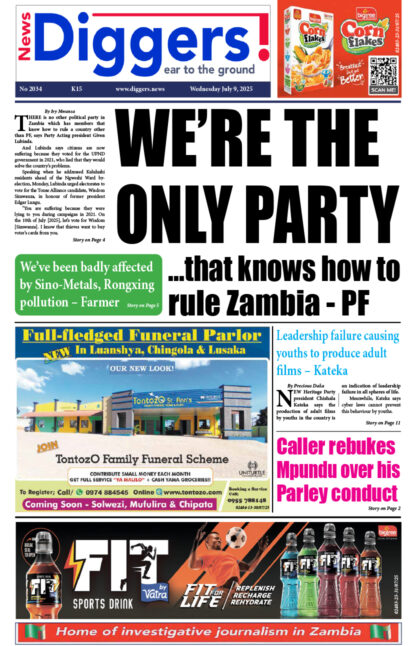THERE is currently no Wheeling Agreement between ZESCO and CEC, nor is there a valid agreement for the supply of electricity by CEC to KCM, to warrant further supply of power or use of CEC’s infrastructure by ZESCO, CEC has argued.
Meanwhile, Konkola Copper Mines (in Liquidation) has submitted to the Lusaka High Court that it will suffer greater inconvenience should there be disruption of power to the mining company, compared to the economic loss that CEC may suffer from use of its infrastructure.
This is a matter in which Zesco Limited and KCM have sued the Copperbelt Energy Corporation (CEC) in the Lusaka High Court, seeking a declaration that CEC’s action to restrict power supply to KCM contravenes the law.
ZESCO and KCM are seeking an order of injunction restraining CEC by itself, its Directors, Officers or agents from interfering in the Time Sheet Agreement between the Plaintiffs through restricting KCM from receiving supply from ZESCO pending determination of the matter.
They also want among others, an order restraining CEC from effecting or taking steps to take out any supply units, lines or delivery points to KCM as they are Common Carriers as declared under S.l. No 57 of 2020.
However, in affidavit in opposition to summon for a mandatory injunction filed in the Lusaka High Court, CEC Chief Operating Officer Christopher Nthala explained that the company wheeled power on behalf of ZESCO on the Copperbelt using its network comprising over 1000 kilometres of high voltage transmission lines and 43 substations across the Copperbelt.
“CEC owns and operates a transmission interconnection with the neighbouring Democratic Republic of Congo (DRC) through which it supplies power to some mines in DRC and also wheels power to and from the DRC on behalf of member countries of the Southern African Power Pool (SAPP),” the affidavit read.
“CEC has issued share capital of 1 ,625,000,597 owned by a diverse universe totalling 4,632 shareholders who comprise Local companies, Pension funds, Individuals, Professional Bodies, Faith Based Organisations, Co-operatives and Foreign Companies.”
Nthala further explained that CEC and ZESCO had a contract for the supply and purchase of power referred to as Bulk Supply Agreement (BSA) which was entered into on November 21, 1997 and expired on March 31, 2020, following an extension of its original tenure of 15 years to 20 years.
He added that CEC had been the main supplier of power to the mines on the Copperbelt , consequent to which it entered into various existing long term power supply agreements (PSA), including that with KCM whose term expired on March 31, 2020 but was extended to May 31, 2020 by mutual agreement.
“Between February and March 2020, CEC and Government Negotiating Team (GNT) which comprised ZESCO and representatives from Government, were engaged in negotiations for a new power supply agreement to replace the BSA,” Nthala stated.
He stated that while the initial understanding was that the parties would work to put in place an interim agreement, it became clear during the negotiations that ZESCO’s intention was to enter into a new agreement with totally different terms.
Nthala stated that as at March 31, 2020, ZESCO and CEC had not reached an agreement with respect to a new power supply agreement.
He, however, stated that while discussions relating to the power supply agreement between CEC and ZESCO were still pending finalisation, another matter arose following CEC’s attempts to recover a debt well in excess of USD144 Million owed to it by KCM.
Nthala stated that KCM as a customer of CEC was under a legal duty to pay its electricity bills for power supply received from CEC and that CEC was legally entitled to suspend supply of electricity to KCM if KCM as a customer defaults on its duty to settle its bills.
“On May 29, 2020, the Minister of Energy declared all CEC’s transmission and distribution lines as common carrier via Statutory Instrument No. 57 of 2020. The declaration is intended to facilitate transmission of electricity power from ZESCO to KCM using the CEC transmission and distribution lines,” read the affidavit.
“That there is currently no Wheeling Agreement between ZESCO and CEC, nor is there a valid agreement for the supply of electricity by CEC to KCM, to warrant further supply of power or use of CEC’s infrastructure by ZESCO.”
But in its submissions in support of an order of mandatory injunction, KCM argued that despite the transmission and distribution lines being private property of CEC, the Minister of Energy was empowered by law to designate private infrastructure in the power industry as being available for transmission of power to the general public.
KCM implored the court to take judicial notice of the fact that apart from conducting mining operations, it also provides various amenities to the community of which the most critical were the various clinics and mine hospitals.
“My Lady, one cannot garnishee further the critical role that reliable power supply plays in the operations of the hospitals. Life cannot be measured in terms of nor atoned for by payment of money in damages. Further my Lady, one of the fundamentals of mining is the dewatering exercise. The de-watering pumps cannot be switched off at all without the risk of flooding,” KCM submitted.
“The second plaintiff (KCM) will suffer greater inconvenience should there be disruption of power compared to the economic loss that the defendant (CEC) may suffer from use of its infrastructure at a rate currently determined by the ERB as opposed to that agreed between it and Zesco. It is thus our submission that the balance of convenience in granting the injunction lies with the plaintiffs.”




















One Response
It’s sad what the pf govt is doing to CEC